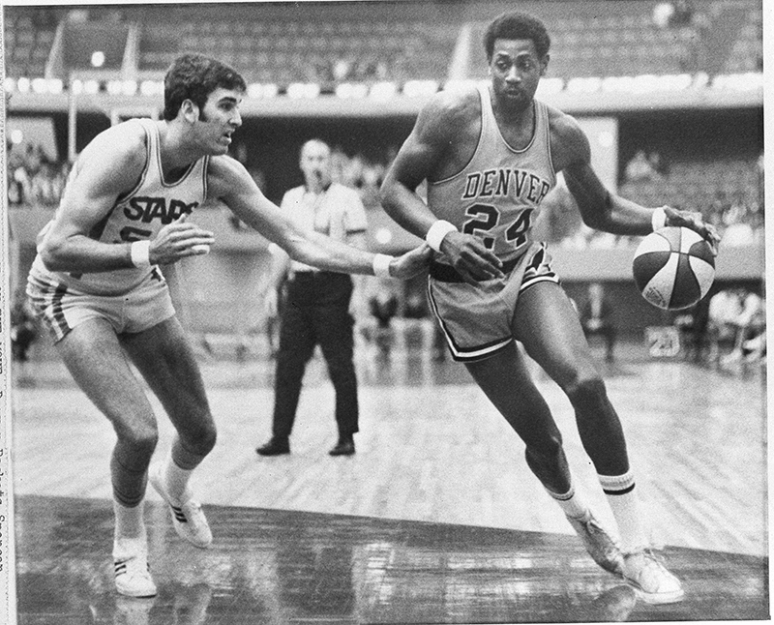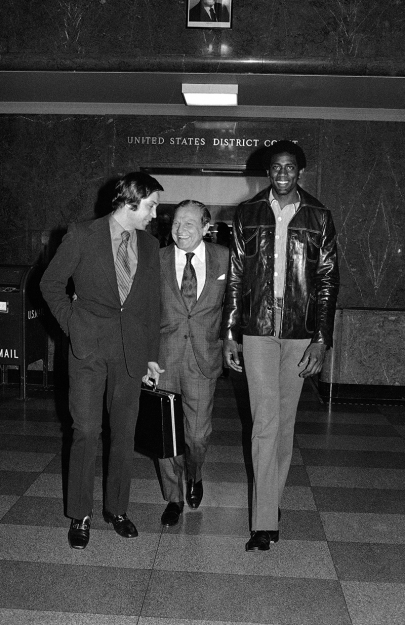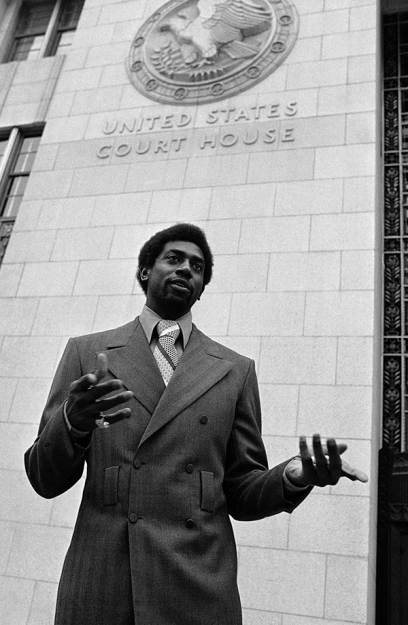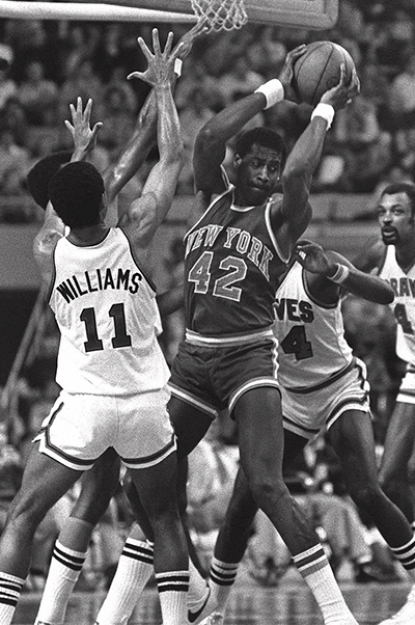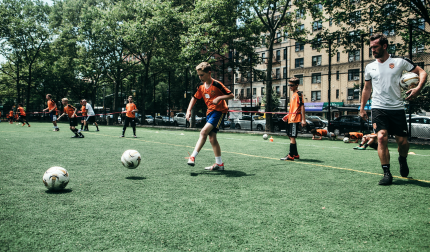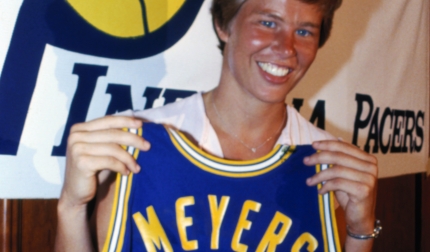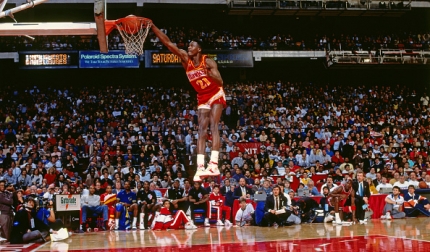Tell us about your hometown, Silver City, Mississippi.
We have a population of maybe 300 people and that’s countywide. It wasn’t really a city. It had one general store, one post office, and no flashing light. It was a farming community in Mississippi where you did cotton picking. Now it’s catfish farming. But back then, it was cotton, cotton and more cotton.
How did you find basketball?
Well, we played basketball. We didn’t have money to buy a basketball, so my mother made us one out of a crocus sack, which was a bag that you would put potatoes in. She made us a ball that didn’t bounce, so you had to get two imaginary bounces. Basketball was not my first love. My first love was golf. I lived and worked on a golf course. We weren’t allowed to play on it, because it was segregated, but we played on it. I didn’t start playing golf until about three years ago, but right away the love came back for the sport.
In 1968, the Olympics propelled you onto a national stage. But 1968 was a tumultuous political year. How did you feel going into the games?
I was excited. I was an 18 year old who just finished freshman year of college. I was so delighted they had called me. Three years before, I was picking cotton in Mississippi, hoping I could get out of high school. To be representing America? I was a second-class citizen there. So what an incredible leap! You hear how Don King says, “Only in America,” but it really is. I don’t think I’ve could have done that anywhere else.
How did the ABA opportunity come about?
Kareem Abdul-Jabbar was the MVP of the NCAA that year. I finished second behind him. The Milwaukee Bucks signed Kareem. At that time, the ABA and NBA were raiding each other. I said if Will Robinson wasn’t hired as the basketball coach at Detroit, I wouldn’t stay at the university. Lo and behold, the university didn’t hire him. I didn’t have a place to go. A team in Belgium came up with an offer, but I didn’t want to go there. It was Hannah Storm’s father, Mark Storm, who was the commissioner of the ABA. He contacted Will and said, "We’ll take him." At that time, everyone was honoring the four-year rule—you either played in college for four years, or you did what Wilt Chamberlain did, you play three years and then play with the Harlem Globetrotters for a year.
Now you're 19 years old, and everyone in the league is older.
Much older.
How awkward was that for you socially?
It was like a kid with adults. And they were beating my butt on the court. I mean, I played well. That first season, I was the MVP, the leading scorer and rebounder in the league, but it was a serious challenge. I remember guys like George Govan, Red Robbins, Mel Daniels, Rick Barry; these guys beat your ass. I was in three fights that year! In the pros, this was a job. This was their livelihood! The coaches on the other team would be like “Beat this kid’s ass, Let’s see if he’s for real.” But I just enjoyed playing. I thought I was doing something, really opening up doors. This was in the last years of the 60’s, I had been through all kind of upheaval, the riots in Detroit, you name it. You had a sense of purpose at that moment. It wasn’t for you. You might not succeed, but you were paving the way for someone else. You were always looking to do something historically.
Can you explain how your ABA contract worked?
After my first year in the ABA, they said look, we’re going to make you the highest paid player in professional basketball. With that, they brought in this guy named Jack Dolgoff. He was from Wall Street. Dolgoff came up with the idea that they could give me a contract that was literally for six years and $400,000. But we can say to the public that the contract is worth $1.9 million if we put $10,000 into an annuity each year and let I grow until I got to age 70. Then, I could take down $100,000 per year from age 70 to age 100. So in other words, I still wouldn’t have seen that money yet
What did you do?
There was a young attorney named Al Ross who was new on the scene. He was looking for loopholes, and at that time, the NBA was saying they would sign me to a contract, but I couldn’t play for another year. And Sam Schulman, the owner of Seattle said “I have the rights on the second player to come out of the ABA.” The first player was Connie Hawkins. Connie went to Phoenix. Phoenix and Seattle were the two expansion teams, so Seattle had the second pick. Seattle said, we’ll sign you and you can play this year. We’re going to have to go to court, of course, and there we were.
The case went all the way to Supreme Court before it was settled. Did the court process take a toll on you?
Oh yes, that was a killer. If I wasn’t born in Mississippi and had gone through a lot of stuff as a child, I mean you had to be tough! There were a lot of things that you were discriminated against for. I looked at it all like, well at least it wasn’t as bad as picking cotton, so that was my reference point. It was tough on me when I would go to the next arena to play, and they would make a public announcement, “Ladies and gentlemen, we have an illegal player on the floor and he must be escorted out.” This was after I warmed up and was ready to start the game, they would hand the injunction to the PA announcer. Of course, people would throw things and do things too. It was an incredible time.
Those early days with the Seattle Supersonics, you hurt your knee in Seattle because the roof of the arena was leaking. The conditions weren’t near what they are today.
Oh goodness, no. We flew commercial airlines. Sometimes there were three straight games, and we were way up in the Northwest. There was no Portland team yet, so we would have to go out, and you would come back a month later with a beard, and your kids were like “Who is this person?” On top of that, the rule was you had to take the first flight out the next day to make sure you made it to the city on time. So you would have a trip from Los Angeles to Chicago, to New York to Baltimore, and you would be on the first flight in the morning each time.
What was playing for Bill Russell in Seattle like?
It was a good experience, but Russ and I didn’t get a chance to appreciate it until we were separated. I was getting pressured from a number of players, saying “You’ve got to stand up for our rights, but Russell is your daddy.” Russ and I would talk in deep terms, because he took it upon himself to educate me about the game and about life. We had a kinship, because he was from Louisiana. But my teammates, I went from bringing guys into the league like a revolutionary to being a corporate trader (laughs).
You made First Team All-NBA with Seattle. When the opportunity came to go to the New York Knicks, were you excited by the prospect?
No, I was really hurt by it, because I thought I had been betrayed Seattle. I hurt my knee there; I went through my case there; I moved my family from Mississippi to Detroit to Seattle, so everything was there. I felt a serious betrayal.
How did you cope with that? The expectations must have been enormous.
Well the Knicks had three players who just retired that I had played against and I was supposed to replace all three guys—Willis Reed, Dave DeBusschere and Jerry Lucas. And you’ve got one guy going to replace all of these guys. So when they had a press conference and they asked, “Are you the savior?” I said, “Yes!” (laughs) Well they beat me down for years with that.
You and Bob McAdoo were on the Knicks. Both of you were big versatile players that were challenging conventional basketball. Do you feel you were at the forefront of the evolution of the game?
Bob came in under the Spencer Haywood rule, too. So we were both young guys that developed while we were playing in the NBA. That meant we played with a lot more freedom than the guys who played at that time. When I would rebound and dribble it up the court, they would look and say “What? Get rid of the ball, you can’t dribble.”
Did you have supporters at the time?
I would go down to the Village to listen to jazz. That was my refuge. I would run into Bill Cosby, Clint Eastwood, all these people down there. Bill Cosby would tell me, “You’re like a jazz musician, they don’t understand what you’re doing, but you’ll meet them at the same time. So you keep doing what you’re doing, because they don’t understand you.”
Do you carry any fond memories of the New York experience?
Oh sure! I met my first wife, Iman, there while I was with the Knicks. We had our baby there. And I thoroughly enjoyed playing with Walt Frazier, Phil Jackson, Bill Bradley, Earl Monroe and being taught by Red Holzman, even if I may not have been listening at the time. Later on those things came to pass. And, man, I loved that city.
How did you deal with going from the Knicks to the Lakers?
It was different for me. I had lived there in the summer months. I went there with a different attitude. When I came there, everything as different. I hadn’t lived the way I should have and that life was destroying me. It was demonic.
Was that the biggest regret of your career?
Yeah. But it was because of me; it wasn’t because of anyone else. I had done weed before, but cocaine was never my thing. When I got there, I got involved in a bad way. We had a great young guard named Magic Johnson; I always wanted to play with Kareem, my longtime friend. It was perfect for me, but I was blinded by the drug. Other guys in the league were using, and they would look at me and say. “Why can’t you handle your shit?” (laughs) I said, “I don’t know. Maybe I’m weak.”
Then you became a pioneer again and played in Europe, one of the first players of your status to go abroad.
Everyone said we’re going to exile him to Italy. We’re going to put him in Venice. Venice is a great place to get exiled to. At the time, it was a new chance for my marriage with Iman, because she was doing fashion shows in Milan, so it was a chance for us to spend time together. I was only playing one or two games a week, and I could get to Paris or Milan pretty quickly. It was a beautiful city and a beautiful time. I came back to play with the Bullets. I still watch our playoff series with the Celtics on NBA TV.
Do you have any advice for younger players based on your incredible journey?
Know your history, and appreciate it. Don’t be afraid of it. The guys that left early still act ashamed. I don’t think Bill Gates is ashamed of leaving college early or Steven Spielberg. You won’t hear. “I’m so sorry I left college to do Jaws,” or “I’m so sorry I left to make Microsoft.”


